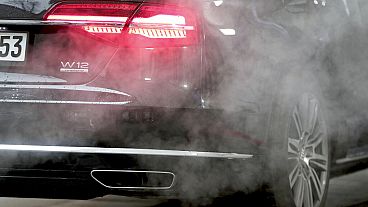We consider the brands reducing denim's environmental impact.
Denim is a staple for every man and woman in the 21st century, but what you might not know is that it is one of the most pollutive and water intensive fabrics in production. Jeans can be bought so easily and are the centerpiece of the fast fashion industry, but this type of production facilitates poor working environments, and releases toxic chemicals.
Why is denim not eco-friendly?
Denim uses copious amounts of water through the three processes that go into creating the perfect pair of jeans: growing the cotton, dyeing and finishing the material, and finally texturising the product. Some more eco-conscious brands use up to a 5th of the amount of water used in the production of a ‘normal’ pair of jeans.
Approximately 10,000 litres of water is used in the production process for one single pair of jeans.
Environmental and human cost is high in denim production. Harmful chemicals that go into creating acid-wash and distressed denim are intensive and your jeans could be going through up to 3 intensive washes. Exposure of such harmful chemicals and the run-offs of these washes can seep into the local water systems of the cotton workers, putting them at health risk.
Organisations like the Better Fund, invests and supports innovations within cotton farming that foster the Better Cotton Standard System. Transforming cotton production, charities such as these endeavour to make the industry better for the farmers, thereby feeding into the rest of the industry - the cotton quality benefits and so does the market. The whole process is consequently far safer and more sustainable.
As a solution to the environmental and social cost of cheap fast denim we have found 4 European brands. These introduce us to the value and craftsmanship that should be going into it, showing us that denim is to be lived in, nurtured, and last, just like our planet.
Hiut Denim Co.
Brought to the forefront of British style by Meghan Markle, who wore a pair of the company’s jeans in Cardiff last January, Huit Denim Co. is promoting a new kind of eco denim. Hiut Denim’s ambition is to bring material back to reliable craftsmanship. For 40 years Cardigan was the UK’s most productive denim factory, with an output of around 35,000 pairs of jeans a week. Due to this factory closing in 2002, hundreds of jobs were lost and Cardigan lost its purpose. Hiut denim was created as a response to this event. In order to repair the devastating consequences of the factory’s closure, Hiut gave jobs back to local people who were already skilled in the field.
The business started with The Denim Breaker Club initiative, which entailed getting ‘breakers’ to quite literally break the the jeans in for 6 months, sending them back to Hiut, so that the company could give them one good wash and sell them - giving the breaker 20% of the profit. Essentially people were paid to wear the jeans to break them in - a unique and loony idea! However what the brand was trying to inspire in the consumer was a more eco way of owning denim. So much water goes into denim production, therefore abstaining from denim washing makes up for this cost. Though the initiative has stopped, the brand still encourages the “No Wash Club Rules”:
1st Rule: Six months without washing means six months.
2nd Rule: No Cold dip in the bath.
3rd Rule: No showers.
4th Rule: Rain happens. Get an umbrella.
5th Rule: Freezing them is allowed.
6th Rule: Airing them on a washing line is allowed.
7th Rule: Rest days are allowed.
8th Rule: If you are going to try, go all the way.
With free repairs whenever you need them, the brand ensures that each pair of jeans is built to last - a real purchase for life.
ULLAC
ULLAC is a new denim brand born in 2017 which advocates gender neutrality, fostering a socially and environmentally conscious ethos. The brand’s image is trendy, functional, one of utility and pop-culture.
They comment on their website: “sustainability and paying people fairly is very important to us and we only work with nice people, who we like, who care about that too.”
The website is consciously transparent, elucidating where all of the fabrics are from and who they are made by. Their fabric is often sourced from Velcorex in France, who have their own water waste treatment plant. It is also linked with BCI, who promote better standards in cotton farming through the encouragement of fair labour, training for farmers, minimising pesticides or harsh chemicals, and economic development. The denim comes from Candiani, Northern Italy, the “(g)reenest Mill in the blue world”, crafting in 40% BCI cotton, which is amongst a few of the reasons why they have been awarded the Global Organic Textile Standard and Global Recycling Standard. Watching over each stage of the production line, ULLAC have fostered an intimacy with their brand, ensuring that each piece is made with an eco conscious mindset to the highest quality.
Each purchase comes in reusable and recyclable packing in an effort to ensure that their production line is every bit as ethical as possible. Their current collection is designed to be lived in and last.
CLOSED
The German brand Closed also uses the Candiani Denim Mill, who lie at the forefront of sustainable denim. Though the company is not yet a certified eco-label, Closed plays a huge role in innovating denim in order to make it a kinder industry. The company is known for its chic style and popular pedal pusher pocket detailing.
Utilising Everest Laundry near Venice, Closed create their much loved finishing techniques ecologically. For faded looks and manipulating different shades of blue they use lazer and ozone gas, which hugely minimises water, chemical and electrical usage. The brands stone-washing technique substitutes the cheaper but potentially more dangerous process of sandblasting, for the safer use of artificial stones in a drum, creating the same stone wash effect without the output of water and harmful stone debris.
MUD jeans
MUD Jeans, founded in the Netherlands, crafts denim with an eco footprint. MUD’s dedication to creating a better social, economic and environmental world is supported by an array of certificates, such as BCORP, PETA-approved vegan, Cradle 2 Cradle, Ecocert, GRS. The statistics are compelling: the brand claims to have saved 300 million litres of water, avoided using 700,000 kilos of CO2 and saved 12,000 jeans from landfill in the past 3 years.
“Our wildest dream is to one day sell 100% recycled denim and therefore close our loop entirely.”
In order to create a cyclical economy MUD takes in its old jeans, which are at the end of their lives, and turns them into new ones. It uses recycled and organic cotton and avoids using single-use products, specifically utilising stainless steel buttons, rather than mixed metals, so they can be easily recycled or reused. Like the jeans by Closed, MUD uses laser, ozone and E-flow techniques for the finish of the jeans. The few chemicals remaining in the production process are non-toxic and Nordic Swan Ecolabel certified.
Words: Kiltie De Cleyn



